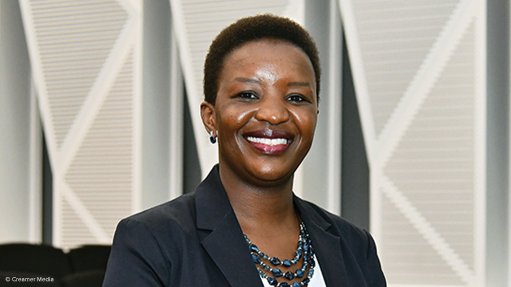
BLSA CEO Busi Mavuso
Photo by: Creamer Media's Donna Slater
The last week has brought about a boost in confidence for Business Leadership South Africa (BLSA) CEO Busi Mavuso in government’s ability to start delivering on reforms.
She says in the organisation’s latest newsletter that President Cyril Ramaphosa’s weekly letter had fostered optimism, since he discussed the draft National Implementation Framework toward the Professionalisation of the Public Service.
Mavuso explains that this is a significant step toward depoliticising the public service and ensuring appointments are based on merit.
Additionally, Mavuso expresses relief at the traction that Operation Vulindlela is beginning to get.
“We often say South Africa is a country of many plans but little implementation. Operation Vulindlela is an initiative by the National Treasury and the Presidency to focus on delivering structural reforms that have already been agreed on by Cabinet.
“It is about the hard work of details – often an agreed policy can encounter all sorts of issues among the reeds of policy implementation. Vulindlela has pulled together highly capable people to support front-line departments in delivering.”
Again, Mavuso adds, this is potentially positive as long-standing implementation delays like visa reform and spectrum auctions can be catalysed by the Vulindlela process.
“Indeed, it has already been able to deliver a new scarce skills visa list, although I had hoped there would be deeper reform of the whole approach to visas,” she avers.
Mavuso reports that the BLSA council last week had a very positive engagement with the Vulindlela team from the Presidency and the Treasury, which outlined the objectives of the Vulindlela project.
Vulindlela does not do policy reform itself, but rather supports its implementation, helping the public service resolve challenges.
The team is focusing on delivering energy supply policy, reducing the cost and improving the quality of digital communications, developing sustainable water supply, competitive and efficient freight transportation and introducing a visa system that attracts skills and grows tourism.
These all have the potential to deliver the long-awaited structural reforms that Mavuso has often highlighted as essential to kick-starting economic growth and beginning the process of restoring economic growth, jobs and tax revenue.
“We have long called for implementation as the only thing that now matters. Plans are done and settled, there is no reason for further debate; only to implement what has been decided.
“Organised business has already come together through the National Business Initiative to set up Tamdev – a mechanism to channel deeply experienced skills into the public sector where capacity constraints are holding up change. But we are keen to explore ways we can further support the Vulindlela process,” she says.
Mavuso laments that implementation of reform is key to rebuilding confidence in the business sector.
It is only when evidence of change becomes apparent that business believes a better future awaits and starts to invest for new opportunities.
For that to happen, business needs to see government as an institution that keeps its word, that delivers changes when it says they will happen.
“Last week, these efforts by the President and his colleagues provided some of the best indicators I’ve seen that implementation is being taken very seriously. I applaud the work done and look forward to finding ways that business can further support and catalyse them,” Mavuso concludes.